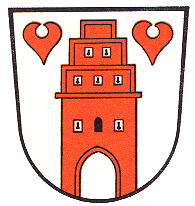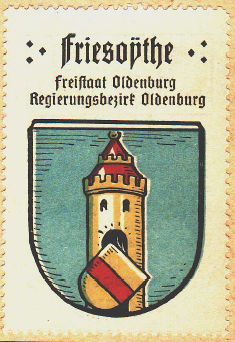Friesoyte: Difference between revisions
Knorrepoes (talk | contribs) m (Text replace - "'''Origin/meaning :'''<br/>" to "====Origin/meaning====") |
Knorrepoes (talk | contribs) m (Text replace - "|width="15%"|50 px|right |}" to "|width="15%"|50 px|right |}<seo title="Wappen, Gemeindewappen" />") |
||
| Line 3: | Line 3: | ||
|width="70%" align="center" |'''Heraldry of the World<br/>Civic heraldry of [[Germany]] - [[Deutsche Wappen|Deutsche Wappen (Gemeindewappen/Kreiswappen)]]''' | |width="70%" align="center" |'''Heraldry of the World<br/>Civic heraldry of [[Germany]] - [[Deutsche Wappen|Deutsche Wappen (Gemeindewappen/Kreiswappen)]]''' | ||
|width="15%"|[[File:Germany.jpg|50 px|right]] | |width="15%"|[[File:Germany.jpg|50 px|right]] | ||
|} | |}<seo title="Wappen, Gemeindewappen" /> | ||
Revision as of 17:18, 5 November 2012
| Heraldry of the World Civic heraldry of Germany - Deutsche Wappen (Gemeindewappen/Kreiswappen) |
FRIESOYTHE
State : Niedersachsen
District (Kreis) : Cloppenburg
Additions : 1974 Altenoyte, Markhausen, Neuscharrel
Origin/meaning
The arms were granted in 1958.
The arms show the local city gate, the old symbol of the town and the memory of its old history. The gate was destroyed in the Second World War. The two water lily leaves are taken from the arms of the counts of Tecklenburg, who ruled the city before 1400. The oldest seal of the city dates from around 1350 and shows a single leaf.
After the transfer from Tecklenburg to Münster in 1400 the seals showed a city gate, sometimes with the arms of Münster placed in the gate.
In 1937 the city got its first official arms, which were identical to the last seals, i.e. the gate/tower with the arms of Münster, see image below. This was changed in 1958 to indicate that Friesoythe got city rights from the counts of Tecklenburg.
| The arms in the Kaffee Hag albums +/- 1925 |
Literature : Stadler, K. : Deutsche Wappen - Bundesrepublik Deutschland. Angelsachsen Verlag, 1964-1971, 8 volumes; Hupp, 1920s.


